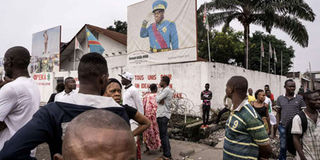Kabila has many options he can still exploit

People look on during a demonstration calling for the President of the DR Congo to step down on January 21, 2018 in Kinshasa. AFP PHOTO | JOHN WESSELS
What you need to know:
- It’s worth of note that since the chaotic independence from Belgium in 1960, the DRC has had four leaders.
- About 4.5 million people are internally displaced and 650,000 are refugees in Tanzania.
With long overdue presidential elections scheduled for the end of this year, the two houses of the Democratic Republic of Congo were last week summoned to an extraordinary session.
The lower house, formally the National Assembly, said its sitting, beginning Wednesday, will run until July 19, the state TV reported.
Senators also received messages requesting attendance. Included in the agenda are six issues of a proposed law on "the status of elected former presidents of the republic."
It’s worth of note that since the chaotic independence from Belgium in 1960, the DRC has had four leaders.
President Joseph Kabila, 47, and ruler since 2001, is the only one alive.
IMMUNITY
The National Assembly, according to South Africa’s Nws24, will also discuss a report on the Independent National Electoral Commission, especially proposed replacement of some members. There are several points to note here.
Were the proposed law on the status of former presidents to contain goodies, including immunity from prosecution, indications might be that Kabila plans to exit active politics after the December 23 elections. That would be most welcome news. Kabila’s second and constitutional second term ended in December 2016.
Elections that should have been held were rescheduled for 2017 and postponed to this year. Since 2015 to last year, the issue of Kabila’s exit has led to anti-Kabila protests and authority’s brutal suppression.
The postponement of elections resulted from Kabila’s ability to find ruses to exploit a constitutional provision: a sitting president can stay on the seat until a new one is sworn in. Well, the DRC, sprawling and rich in natural resources, has never actually had anything resembling peace.
POSTPONEMENT OF ELECTIONS
This gives the incumbent plenty of opportunities to create conditions necessitating postponement of elections.
As the country is now, in eastern Tanganyika province, for example, about 120 armed groups exist and there are attacks in South Kivu province.
The same goes in Kasai province. If a quarter of the country is experiencing conflict, that’s legally a reason to postpone elections. Additionally, more than 1.3 million in the country need humanitarian assistance.
About 4.5 million people are internally displaced and 650,000 are refugees in Tanzania.
GOODIES
That’s not all. An estimated 10 million citizens in diaspora are entitled to vote and, therefore, must be registered.
Assuming Kabila doesn’t get the "goodies" or is uncertain of his future, another plausible possibility Kabila can exploit exists. He can "generate" causes of keeping the issues of the status of former presidents and electoral commission changes pending in the legislature, which is normally on recess from June to September, good reason to postpone the elections. When the electoral commission published the polls calendar in January the international community applauded.
The point here is that Kabila has options if he genuinely doesn’t wish to relinquish power, "promises" to do so aside. Cited above are just modest examples. Cross your fingers!




